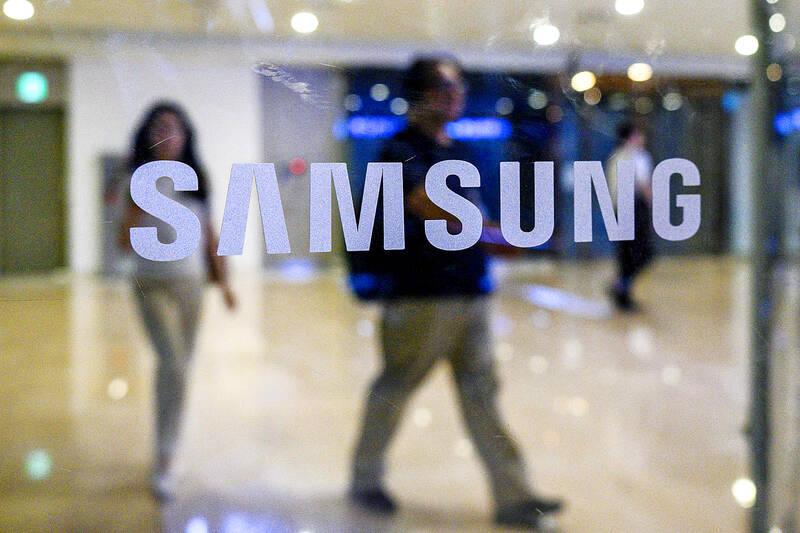A South Korean executive accused of stealing semiconductor information developed by Samsung Electronics has been detained again on fresh allegations related to the theft of chip processing technology, a court official and his lawyer said yesterday.
The Seoul Central District Court issued a warrant to detain Choi Jinseog on Thursday due to concerns that he was a flight risk, a court official said, who declined to provide further details.
Choi, a former Samsung executive who ran a chipmaking venture in China, has already been the subject of a high-profile industrial espionage trial since July 2023 and was arrested and released on bail last November.

Photo: AFP
Choi has rejected the charges.
He now faces new allegations of being involved in stealing information related to 20-nanometer DRAM chip processing from Samsung, Choi’s lawyer Kim Pilsung said.
Kim said his client denied any wrongdoing and the information he is accused of stealing is publicly available.
Choi has not been indicted over the new allegations, his lawyer said.
Samsung has declined to comment.
In a case that underscores South Korea’s efforts to crack down on industrial espionage and slow China’s progress in chip manufacturing, Choi was indicted in June 2023, accused of seeking to build a copycat chip factory in China with sensitive information developed by Samsung.
The award-winning engineer was once seen as a star in South Korea’s chip industry.
After being freed on bail, Choi said in April that police were investigating him and one of his former employees, an ex-Samsung worker, over fresh allegations related to Samsung’s chip processing technology.

GREAT SUCCESS: Republican Senator Todd Young expressed surprise at Trump’s comments and said he expects the administration to keep the program running US lawmakers who helped secure billions of dollars in subsidies for domestic semiconductor manufacturing rejected US President Donald Trump’s call to revoke the 2022 CHIPS and Science Act, signaling that any repeal effort in the US Congress would fall short. US Senate Minority Leader Chuck Schumer, who negotiated the law, on Wednesday said that Trump’s demand would fail, while a top Republican proponent, US Senator Todd Young, expressed surprise at the president’s comments and said he expects the administration to keep the program running. The CHIPS Act is “essential for America leading the world in tech, leading the world in AI [artificial

DOMESTIC SUPPLY: The probe comes as Donald Trump has called for the repeal of the US$52.7 billion CHIPS and Science Act, which the US Congress passed in 2022 The Office of the US Trade Representative is to hold a hearing tomorrow into older Chinese-made “legacy” semiconductors that could heap more US tariffs on chips from China that power everyday goods from cars to washing machines to telecoms equipment. The probe, which began during former US president Joe Biden’s tenure in December last year, aims to protect US and other semiconductor producers from China’s massive state-driven buildup of domestic chip supply. A 50 percent US tariff on Chinese semiconductors began on Jan. 1. Legacy chips use older manufacturing processes introduced more than a decade ago and are often far simpler than

Hon Hai Precision Industry Co (鴻海精密) yesterday said that its research institute has launched its first advanced artificial intelligence (AI) large language model (LLM) using traditional Chinese, with technology assistance from Nvidia Corp. Hon Hai, also known as Foxconn Technology Group (富士康科技集團), said the LLM, FoxBrain, is expected to improve its data analysis capabilities for smart manufacturing, and electric vehicle and smart city development. An LLM is a type of AI trained on vast amounts of text data and uses deep learning techniques, particularly neural networks, to process and generate language. They are essential for building and improving AI-powered servers. Nvidia provided assistance

Gasoline and diesel prices this week are to decrease NT$0.5 and NT$1 per liter respectively as international crude prices continued to fall last week, CPC Corp, Taiwan (CPC, 台灣中油) and Formosa Petrochemical Corp (台塑石化) said yesterday. Effective today, gasoline prices at CPC and Formosa stations are to decrease to NT$29.2, NT$30.7 and NT$32.7 per liter for 92, 95 and 98-octane unleaded gasoline respectively, while premium diesel is to cost NT$27.9 per liter at CPC stations and NT$27.7 at Formosa pumps, the companies said in separate statements. Global crude oil prices dropped last week after the eight OPEC+ members said they would